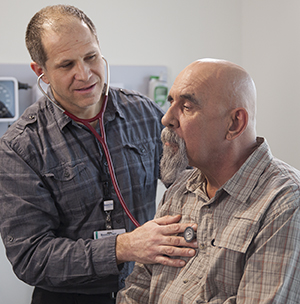Pericardial effusion is the buildup of extra fluid in the sac around the heart (pericardium). If too much fluid builds up, it can put pressure on the heart. This can prevent it from pumping normally.
Types of treatment
Treatment will depend on your symptoms, your health, and the type of pericardial effusion. It will also depend on how bad the condition is, how much fluid built up, and what caused it.
If your pericardial effusion is not severe, treatment may include:
-
Treatment for the cause of the pericardial effusion, such as antibiotics for a bacterial infection
-
Careful checking of the heart with echocardiogram (ultrasound) tests
-
Expanding your blood volume with IV (intravenous) fluids
-
Treatment of pain with over-the-counter pain medicine
If your pericardial effusion is severe, treatment may include:
-
Pericardiocentesis. This is a procedure to drain the extra fluid and relieve the pressure around the heart. It’s done with a needle and a thin, flexible tube (catheter).
-
Surgery. A small tissue sample of the pericardium is removed. This is done to help diagnose the cause of the effusion. It can also prevent the fluid from building up again.
Possible complications of pericardial effusion
In some cases, pericardial effusion can cause cardiac tamponade. Pressure on the heart causes not enough oxygen-rich blood to be sent around the body. If untreated, this can lead to shock. Shock can cause serious problems, such as organ failure and death.
Preventing pericardial effusion
Many cases of pericardial effusion can't be prevented. You may be able to reduce your risk for health conditions that can lead to pericardial effusion by:
-
Eating a heart-healthy diet.
-
Getting enough exercise.
-
Staying at a healthy weight.
-
Not drinking too much alcohol.
-
Quitting smoking and using other tobacco products.
-
Seeing your health care provider regularly to treat all your health conditions.
-
Taking medicines as prescribed by your provider.
Call 911
Call
-
Trouble breathing.
-
Chest pain.
-
Cold, moist skin.
-
Fast, weak pulse.
-
A feeling of weakness or feeling faint.


